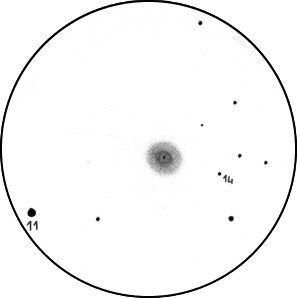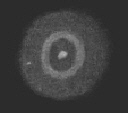 |
Object: NGC 1535 (PK 165-15.1; PN G206.4-40.5; ARO 22)
Observer: Yann POTHIER (France)
Your skill: advanced (many years)
Category: planetary nebula Constellation:
ERI
Object data: Vmag=9.6; Bmag=9.3; 20x17"; type IV+IIc;
central star of Vmag=11.59; discovered by
Herschel in 1785; ELCAT: [OIII, 496+501nm] = 16 x [Hbeta,
486nm]. RA/DE: 04h14.20m, -12°44.'
(2000.0) Date and UT of
observation: 09 February 1997, 20h15TU Location
& latitude:
La Clapiere Obs. (France, latN44 40 00, longE06 27 36)
Site classification: rural, alt.1650m (5500ft)
Limiting magnitude (visual in UMi): 6.0
Transparency (1 to 5 - best to worst): 1 Seeing (1 to 5 - best
to worst): 3 Moon up (phase?):
no Instrument: Coulter 445mm/17.5" F/4.5
Magnification: 312x
Filters used: OIII, UHC, Hbeta
Description: at 312x and OIII, medium sized PN, very bright,
round with sharp edges (fuzzier without filter); at 74x, brighter to the
center; at 312x, a central area only is brighter as in a typical double-shell
PN and the central star is faintly visible; at 312x and OIII, this central
area looks slightly annular (the central star is nor more visible); at
400x and OIII, this annular area looks larger; at low power, the bluish
tint is quite evident; UHC gives a good contrast gain, OIII a very good
one and Hbeta degrades the view (only the central area is left); a wratten
38A blue filter was tried with no contrast gain but acting as the Hbeta
and leaving on the central part visible; estimated diameter of about 63"x55",
central area is 33"x28" because the all is slightly elongated WSW-ENE;
the central star of about mag14 is very difficult to substract form the
central ring. |

